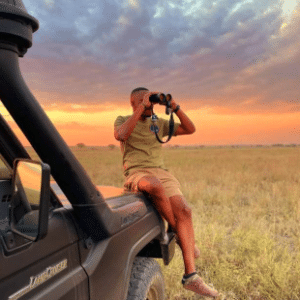The Hadzabe Tribe in Tanzania: Guardians of an Ancient Way of Life
Discover the Hadzabe tribe in Tanzania—one of the last hunter-gatherer communities on Earth. Learn about their culture, lifestyle, language, and how to visit respectfully.
🏹 Who Are the Hadzabe?
Tucked away near the shores of Lake Eyasi, in northern Tanzania, lives one of the world’s last remaining hunter-gatherer societies—the Hadzabe tribe. Also known as Hadzabi, Hadzane, Hadzape, Hatsa, Hadzapi, or Watindiga depending on the region, this small community—numbering around 1,300 to 1,500 people—offers a window into a lifestyle that has remained remarkably unchanged for thousands of years.
As Tanzania evolves into a modern safari destination, the Hadzabe remain deeply connected to the land, surviving on what nature provides—and reminding us all of the roots of human resilience and resourcefulness.
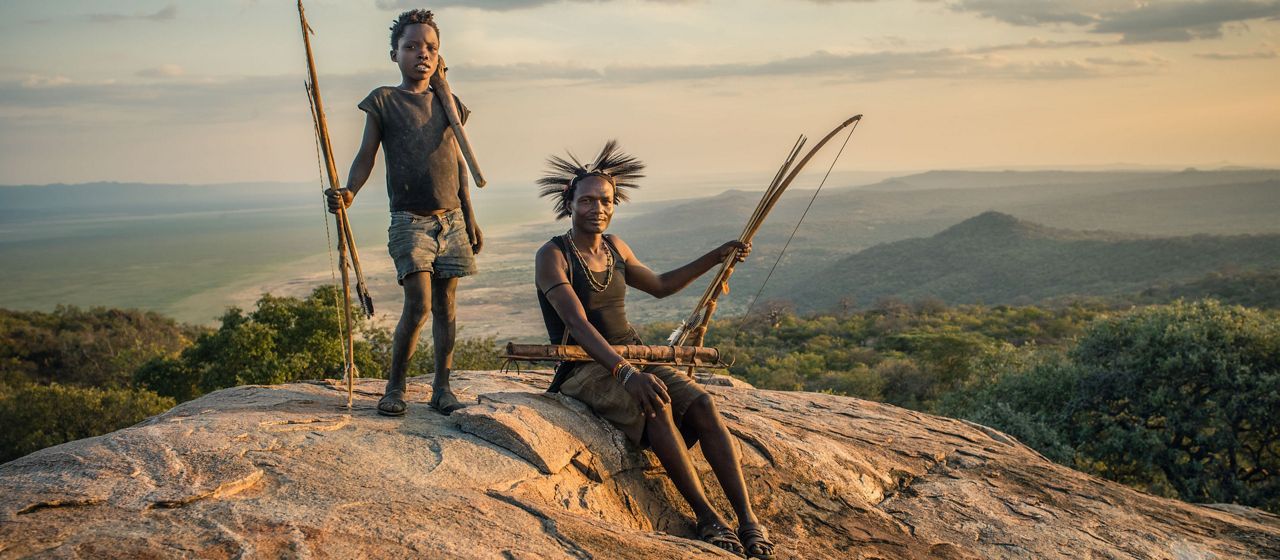
🌍 Where Are the Hadzabe Located?
The Hadzabe people primarily inhabit the Lake Eyasi basin, located south of the Ngorongoro Crater and not far from the famed Serengeti. This arid, semi-savanna region provides the perfect backdrop for their traditional lifestyle, which is dictated not by a clock but by the seasons, weather, and the wild.
Despite being so geographically close to Tanzania’s top tourist hotspots, there are no paved roads, no maps, and no signs guiding you to the Hadzabe. Their presence feels like stepping into a world untouched by time.
🧬 The Origins of the Hadzabe: A 10,000-Year Heritage
Anthropologists believe the Hadzabe are direct descendants of some of the earliest human populations, making them one of the oldest continuous cultures on the planet. Their way of life—centered on hunting wild game and gathering fruits, tubers, and honey—has persisted for over 10,000 years.
Unlike other tribes who have adopted farming or herding, the Hadzabe remain true to their hunter-gatherer roots, a decision rooted in both practicality and philosophy.
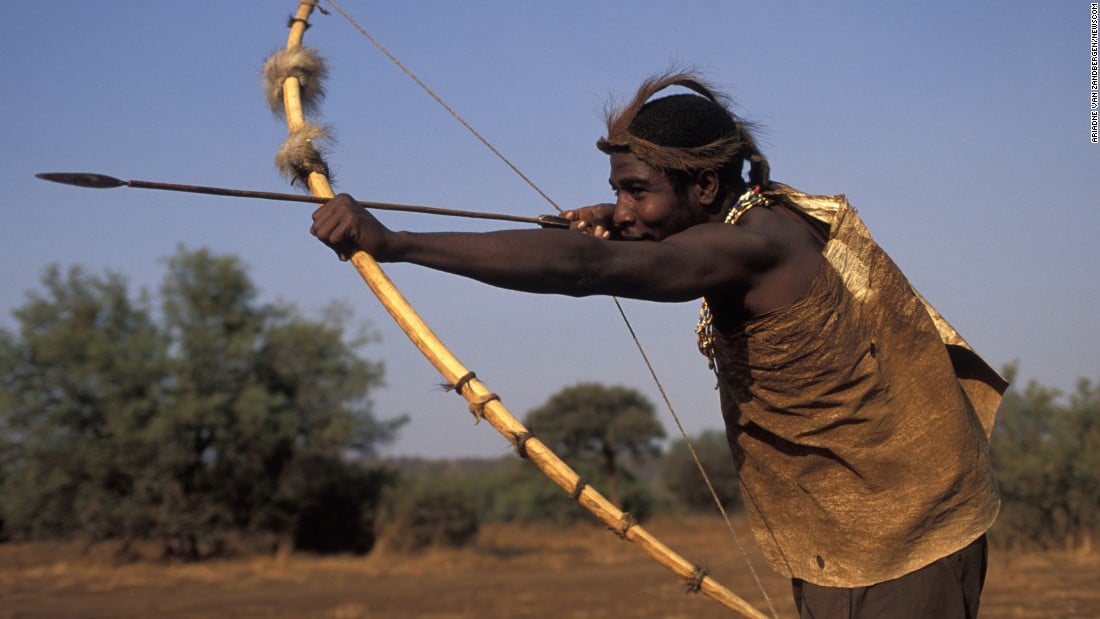
🔥 A Day in the Life of the Hadzabe
🏹 Hunting and Gathering
Hadzabe men rise early and head out with handmade bows and poison-tipped arrows to hunt birds, antelope, and even baboons. Women gather baobab fruit, wild tubers, berries, and other seasonal plants. Honey is also a highly prized food source.
🏕️ Nomadic Existence
The Hadzabe do not build permanent homes. Their temporary shelters, made of sticks and grass, reflect their mobility and low environmental impact. They move frequently, depending on water availability and game movement.
🪵 Resource Efficiency
Everything in Hadzabe life is sustainably sourced from nature—from tools and shelter materials to medicine and food. Nothing is wasted. This connection to the land is not spiritual; it is deeply practica
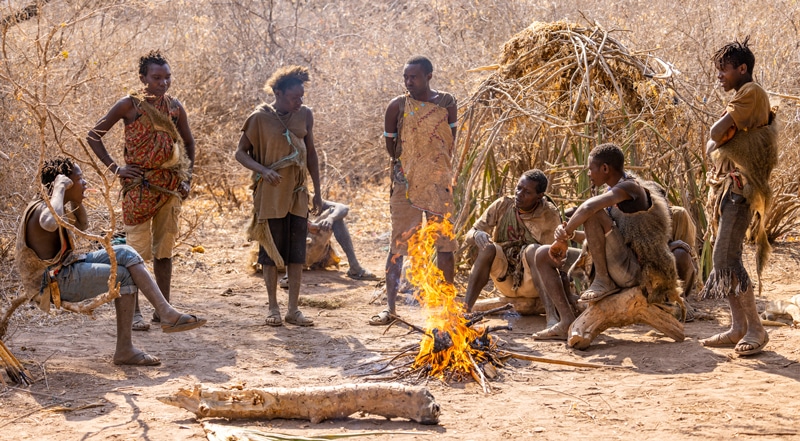
🗣️ The Hadza Language: A Living Linguistic Treasure
The Hadza speak Hadza, a unique language known for its use of click consonants, similar to the Khoisan languages of southern Africa. However, Hadza is a language isolate, meaning it has no known relation to any other language.
This complex, oral-only language includes clicks, pops, and whistles, and it plays a central role in preserving their identity and storytelling traditions.
🧭 Social Structure: Equality Without Hierarchy
One of the most fascinating aspects of Hadzabe culture is their egalitarian social system:
-
No chiefs or formal leaders
-
Decisions made by group consensus
-
Food shared communally
-
Gender roles respected but not rigid
This structure reflects a society that values autonomy, equality, and cooperation over competition or hierarchy.
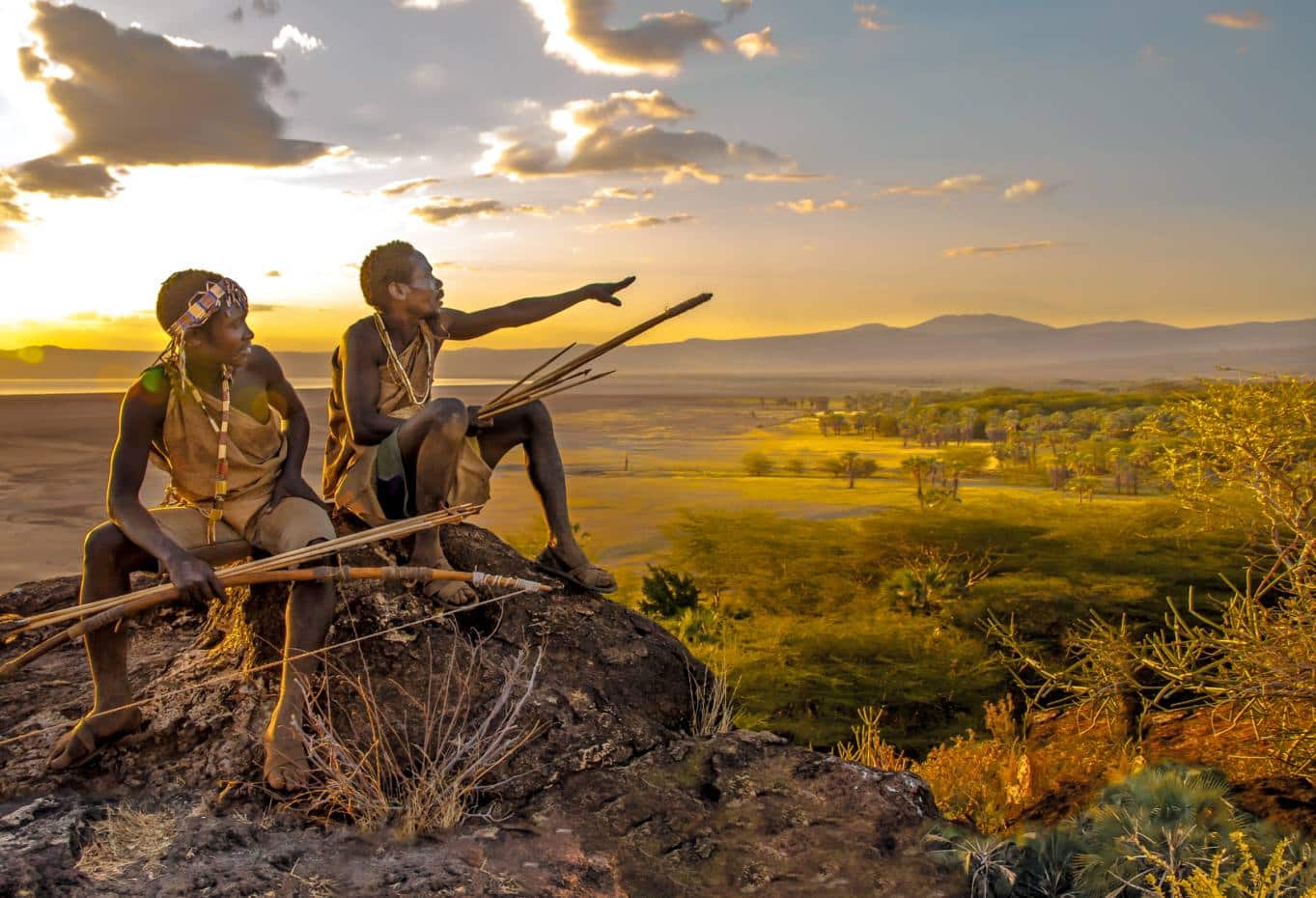
🌿 Spirituality and Belief Systems
The Hadzabe have no formal religion or sacred texts. However, they do believe in ancestral spirits and natural forces, often performing ceremonial dances and rituals before a hunt or during difficult times. These spiritual moments are interwoven with daily life, rather than separated into institutions or temples.
⚠️ Challenges Facing the Hadzabe
Despite their resilience, the Hadzabe face growing threats:
🏞️ Land Encroachment
Their traditional lands have been increasingly overtaken by farming, cattle grazing, and commercial interests. Conservation projects, while well-intentioned, have sometimes displaced Hadzabe communities from ancestral hunting grounds.
💼 Tourism and Exposure
As more travelers seek out authentic cultural encounters, the Hadzabe risk being commercialized or misunderstood. While tourism brings economic opportunity, it must be managed ethically and respectfully.
🧠 Modern Influence
Young Hadzabe are increasingly exposed to schools, technology, and modern lifestyles. While this opens doors, it also threatens the continuity of their ancient practices and knowledge systems.
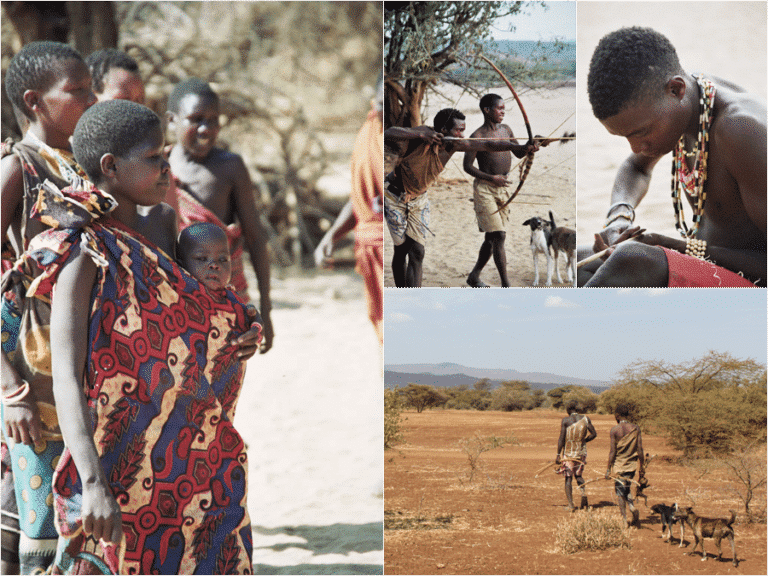
🧳 Visiting the Hadzabe: A Cultural Experience Like No Other
A visit to the Hadzabe near Lake Eyasi offers a raw, immersive encounter with a culture unlike any other. Visitors often:
-
Join the men on a short hunt
-
Practice archery with traditional bows
-
Gather wild tubers with the women
-
Listen to stories around a fire
-
Explore the savannah as the Hadzabe see it
Important Note: Tourism should always be arranged through ethical, community-respecting operators, such as Great Image Expedition, who prioritize consent and cultural sensitivity.
🤝 Cultural Exchange vs. Cultural Disruption
While interaction with tourists and researchers has helped bring attention and aid to the Hadzabe, it’s a delicate balance. True cultural exchange is mutual, respectful, and empowering—not extractive.
As travelers, we must approach visits with:
-
Curiosity, not condescension
-
Respect, not romanticism
-
Support, not exploitation
🧭 How You Can Help Preserve the Hadzabe Culture
-
Book your visit through responsible travel operators
-
Support NGOs advocating for Hadzabe land rights
-
Donate to sustainable development initiatives
-
Educate yourself and others about their unique history
-
Share your experience ethically, avoiding sensationalism
🙋♂️ Frequently Asked Questions (FAQs)
Q: How many Hadzabe people are there?
A: Estimates range between 1,300 and 1,500 individuals, making them one of the smallest ethnic groups in Tanzania.
Q: Is it ethical to visit the Hadzabe?
A: Yes—if done respectfully and through reputable guides who have direct relationships with the community and operate on the basis of mutual agreement.
Q: Do the Hadzabe use modern technology?
A: Some younger Hadzabe have limited exposure to technology, but the majority still live traditionally, without electricity, running water, or modern conveniences.
Q: Can I take photos?
A: Always ask permission first. Not all Hadzabe are comfortable with photography, especially when taken without consent.
Q: Where can I learn more about the Hadzabe?
A: Visit cultural museums in Arusha, read anthropological works, or book a guided cultural tour to Lake Eyasi through Great Image Expedition.
🌅 Final Thoughts: A Living Link to Our Shared Human Story
The Hadzabe are not relics of the past—they are active stewards of a living tradition that has endured against incredible odds. Visiting them offers more than a cultural experience; it’s a reminder of where we all come from, and how diverse the human experience can be.
If you crave a deeper connection with the planet, its people, and the roots of human existence, spend a day with the Hadzabe. You may find that you learn just as much about yourself as you do about them.
📞 Plan Your Cultural Safari Today
Explore the Hadzabe with authenticity and purpose. Let Great Image Expedition take you off the beaten path—with respect, care, and deep local insight.
📩 Email: info@gie.co.tz
🌐 Website: www.gie.co.tz
🌍 Suggested Safari Itineraries:
Travel with purpose. Discover ancient wisdom. Experience the Hadzabe.
